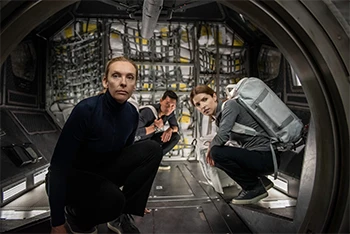The “small space movie” should be a paradox, but as we’ve seen in films such as Moon and Europa Report, leaving Earth is not necessarily a story told best in the form of an epic. Stowaway is the latest addition to this subgenre of intimate dramas set in space, directed by Joe Penna, who also co‑wrote the screenplay with Ryan Morrison. It’s the director/writer duo’s follow‑up to the survival drama Arctic starring Mads Mikkelsen that premiered at Cannes in 2018. Stowaway is essentially a story of survival too, but involving more than a fair share of interpersonal dilemmas.
After a rocky but successful launch, a crew of three starts to settle in at the spacecraft that will be their home and workplace on a two‑year journey to Mars. The mission is part of the grander ambition of the space corporation Hyperion to eventually colonise the red planet, among other things exploring the practicalities of growing food in such a desolate environment. But what was intended as a highly structured and uneventful trip is soon interrupted when the crew stumbles upon one of the most unlikely finds you can imagine on a spaceship – a stranger. This titular stowaway throws off any chance at business as usual. That his unintentional freeride caused damage to essential life‑support systems makes the situation more than just inconvenient. It’s life‑threatening.
The ship’s experienced commander Marina is, like you would expect, expertly played by Toni Collette in her first sci‑fi foray. As the optimistic medical researcher Zoe, Anna Kendrick is a slightly surprising but ultimately excellent casting choice. Her acting style’s combination of sympathy, incertitude and charm fully matches that of a good‑hearted doctor. Daniel Dae Kim, as the algae expert David, and the stowaway himself, Michael, played by Shamier Anderson, round out the cast of four that does the heavy lifting in this decidedly small‑scale drama about the meaning of sacrifice.
Sadly not the standard in science fiction films, Stowaway does not hold back its pursuit of scientific realism. A team of no less than ten scientists and engineers, and those are just the credited ones, served as script consultants to get everything from algae to tethers right. Not only does this bring calm to nitpicking audiences, but also some dramatic beats that have everything to do with the specifics of the physics. What such attention to detail achieves is not just checking boxes but bringing space closer, a sometimes terrifying prospect. Stowaway is not for the spacephobic viewer. Several times, it crosses over from a fundamentally beautiful scenery – the dark, serene backdrop of the universe – to the visually reinforced realisation of infinity and the risk of falling into it, headlong, floating away forever. Zoe and David experience this too on their demanding but necessary spacewalks, taking the crew’s remoteness to its extreme. Almost just an apparition in space, Earth does not make its presence known much, except during radio communication with Hyperion ground control. The home planet’s near anonymity is reinforced by the clever touch of not making audible the voices from Earth, only Marinas’ slightly stern reception of the increasingly bad news.
Stowaway is slow in the best possible sense. What must be considered a complete crisis still unravels at a steady pace, not giving in for fast action or character aggression. When something breaks, whether it’s a piece of equipment or a crew member’s morale, it is gradual and deliberate. Some scenes have an almost hypnotic sensibility, like watching someone play a good game of Tetris. Each piece falling into place, followed by the next one, differently shaped but likewise destined to bring the game to a hopefully rewarding end. Stowaway as a whole is a mesmerising experience with grand vistas and asking pertinent questions about what we are willing to give up for others and humanity. Still, it does not fall into the trap that existential science fiction often does, namely that the moral examination grows so grandiose that it becomes alienating. Stowaway stays personal and relatable. It almost takes the form of an interplanetary kammerspiel. The station is a small stage where a tale of morality plays out around a solid and meaningful motif – minimalist, bounded by close walls and tight spots but surrounded by the dizzying totality of space.
In the end, though, it’s hard to get past that Stowaway decides not to answer the question everyone is asking: how did Michael end up on the ship? Why was a technician inside a life support cabinet screwed tight from the outside? You would expect both onboard and ground crew to get to the bottom of this, but except for some cursory inquiries at the beginning, no one returns to this central enigma. Instead, the story’s focus is the moral implications of the hard choices the crew has to make. However, it’s hard to imagine these rational minds wouldn’t stop for more than a few minutes to think about the impossibility of the chain of events that got them into their predicament. On the other hand, maybe that’s what instant space survival mode does to astronauts. How they got there is of little or no importance, all that matters is to get everyone out alive.

